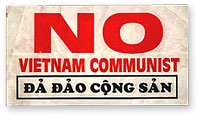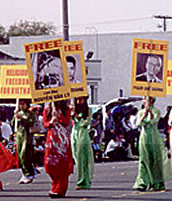|
Most Americans consider the Vietnam War an issue of the past. For many first-generation
Southeast Asian Americans who suffered and lost loved ones during the political
turmoil, however, homeland politics continue to engage them with great intensity
and passion.
 Southeast Asian Americans have formed organizations that focus on homeland
politics; including organizations that strive to overthrow homeland governments
or advocate for political and religious freedom. They have lobbied U.S. politicians
who can shape foreign policy in Southeast Asia. They send money back to their
homelands to support various opposition political groups. Some themselves vie
for political positions in their homelands. At ethnic festivals and events, political
displays are often prominently featured, demonstrating that homeland politics
are still vital and can be volatile. For example, anti-communist Vietnamese Americans
oppose display of the Socialist Republic of Vietnam flag in any venue, preferring
to recognize only the former flag of South Vietnam. Some have lobbied to prevent
politicians, scholars, or entertainers whom they believe are sponsored by the
communist government from entering this country or visiting ethnic communities. Southeast Asian Americans have formed organizations that focus on homeland
politics; including organizations that strive to overthrow homeland governments
or advocate for political and religious freedom. They have lobbied U.S. politicians
who can shape foreign policy in Southeast Asia. They send money back to their
homelands to support various opposition political groups. Some themselves vie
for political positions in their homelands. At ethnic festivals and events, political
displays are often prominently featured, demonstrating that homeland politics
are still vital and can be volatile. For example, anti-communist Vietnamese Americans
oppose display of the Socialist Republic of Vietnam flag in any venue, preferring
to recognize only the former flag of South Vietnam. Some have lobbied to prevent
politicians, scholars, or entertainers whom they believe are sponsored by the
communist government from entering this country or visiting ethnic communities.
Southeast Asian Americans also raise money for charitable causes to help rebuild
their homeland countries, such as to construct schools and medical centers or
to help when natural disasters strike. They send remittances to help their family
members build homes, start businesses, or pay for medical needs. They have advocated
on behalf of those in refugees camps, both to prevent them from being forcibly
repatriated (i.e., sent back to their homeland) and to ensure that those in the
camps find countries to sponsor their permanent resettlement. Southeast Asians
in the diaspora have formed various organizations, some of them transnational,
and continue to remain connected to one another and involved with homeland issues
through new technologies such as the Internet.
In 2004 United Airlines established direct flights from San Francisco to Vietnam,
facilitating travel to the region and opening new possibilities for transnational
links.

|


 Southeast Asian Americans have formed organizations that focus on homeland
politics; including organizations that strive to overthrow homeland governments
or advocate for political and religious freedom. They have lobbied U.S. politicians
who can shape foreign policy in Southeast Asia. They send money back to their
homelands to support various opposition political groups. Some themselves vie
for political positions in their homelands. At ethnic festivals and events, political
displays are often prominently featured, demonstrating that homeland politics
are still vital and can be volatile. For example, anti-communist Vietnamese Americans
oppose display of the Socialist Republic of Vietnam flag in any venue, preferring
to recognize only the former flag of South Vietnam. Some have lobbied to prevent
politicians, scholars, or entertainers whom they believe are sponsored by the
communist government from entering this country or visiting ethnic communities.
Southeast Asian Americans have formed organizations that focus on homeland
politics; including organizations that strive to overthrow homeland governments
or advocate for political and religious freedom. They have lobbied U.S. politicians
who can shape foreign policy in Southeast Asia. They send money back to their
homelands to support various opposition political groups. Some themselves vie
for political positions in their homelands. At ethnic festivals and events, political
displays are often prominently featured, demonstrating that homeland politics
are still vital and can be volatile. For example, anti-communist Vietnamese Americans
oppose display of the Socialist Republic of Vietnam flag in any venue, preferring
to recognize only the former flag of South Vietnam. Some have lobbied to prevent
politicians, scholars, or entertainers whom they believe are sponsored by the
communist government from entering this country or visiting ethnic communities.